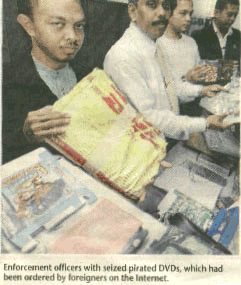Making a fast buck, by hook or by crook
Dato' Dzulkifli Abd Razak
Article
The New Sunday Times - 10/29/2006
THEY are young, upwardly mobile and make a "killing" using their skills. A group of Internet-savvy yuppies make RM36,000 in two weeks fleecing more than 20 bank customers.
A couple in their 20s, dubbed as "IT experts", enjoy life in the fast lane, making RMIOO,OOO a month supplying DVDs worldwide through the Internet.
Article
The New Sunday Times - 10/29/2006
THEY are young, upwardly mobile and make a "killing" using their skills. A group of Internet-savvy yuppies make RM36,000 in two weeks fleecing more than 20 bank customers.
A couple in their 20s, dubbed as "IT experts", enjoy life in the fast lane, making RMIOO,OOO a month supplying DVDs worldwide through the Internet.

The "IT experts", said to have have made RM1 million in the past one year, are pursuing their second degrees at a local university.
Isn't this the perfect picture of young and successful entrepreneurs contributing to the country's economy?
These young people are using their skills to become rich, very quickly. In short, Malaysia's future is in good hands. Right?
Wrong! In all these cases, the law has been broken and they are in trouble with the police.
What is confusing in the two cases is what we consider as pandai (clever). Increasingly, our notion of pandai today is one that is almost automatically linked with material success. The question of pandai apa? (clever in what?) does not seem to figure at all as long as you can stay in the last lane.
Indeed, this seems to be the message that is currently being sent not only to the young generation, but the older ones too. If you think that this is not the case, just recall some of the scandals that have made the headlines of late.
Although this may be nothing compared to the mega-scandals involving companies such as Enron and Worldcom, we will likely get there soon enough if we leave things as they are.
The reason: There is little to prevent them from increasing, not when enforcement is not stepped up. And what more, with education not emphasising on right values.
The dean of the Yale School of Management who was asked in an interview with BusinessWeek (Sept 5-12,2005) whether business schools were doing enough to instill the right values in their students, said: "Not nearly far enough."
In fact, according to him, Enron's former chief financial officer was likely to have turned out to be a bad apple no matter what he was taught at graduate school.
This is because that part of a person's character is developed much earlier than the typical age of a business student of 27.
By implication, fundamentally there is a yawning gap in our educational process, one that many are now recognising as vital to mend in making a truly educated person, not someone who is merely involved in the paper chase (read: money, employability). Degrees and titles are part of the materialistic mindset.
This tendency has received even greater support when some courses are regarded as more "marketable" and therefore more "prized".
What has resulted is the fragmentation in the world of knowledge into even smaller, meaningless and isolated compartments.
Sullivan observes this in his book, Transformative Learning— Educational Vision for the 21st Century (2001):
"Our universities today flounder for want of a larger and more comprehensive context. Having no adequate larger context in which to function, our higher educational institutions operate within a splintered and fractionated world view.
"One of the most common solutions to this vacuum is in the reinstatement of past forms of humanistic studies in a core curriculum, a curriculum which includes philosophy, ethics, history, literature, religious studies and some general science."
While they were once regarded as the soul of learning and respected as sources of wisdom, today they are seen as a waste of time since the market does not want them.
This is very evident in the private education sector where such courses do not sell.
So it is little wonder that what we see emerging today are people who are "clever" in (mis)applying their skills and (mis)using their knowledge to be successful when the end justifies the means.
At least in parts this is reflected in the market place, as documented by author Jennifer Washburn in her book, University Inc — The Corporate Corruption in Higher Education (2005).
It illustrates how some of the most prestigious institutions of higher learning have to go against academic ethics and bend backwards under the pressure of the corporate sector, which incidentally is fast asserting a dominant role in shaping the world view on education.
On the home front, similar admission comes from a leading and long-time corporate leader in relating his experience during a recent interview with The Peak (vol 17, No 8), claimed as the preferred magazine of the diplomatic corps of Malaysia.
He ventured: "The industry is pretty soulless now. I mean, we were definitely in it for the money back then and the creative product has definitely improved since, but it wasn't crude, money-obsessed or disheartening like it is now. I hate to say it, but it's the truth."
If so, how much of such "truth" will be allowed to temper with our education system before it too become "soulless".
Clearly in this issue, failure is not an option, just as much as an education without wisdom or soul!
